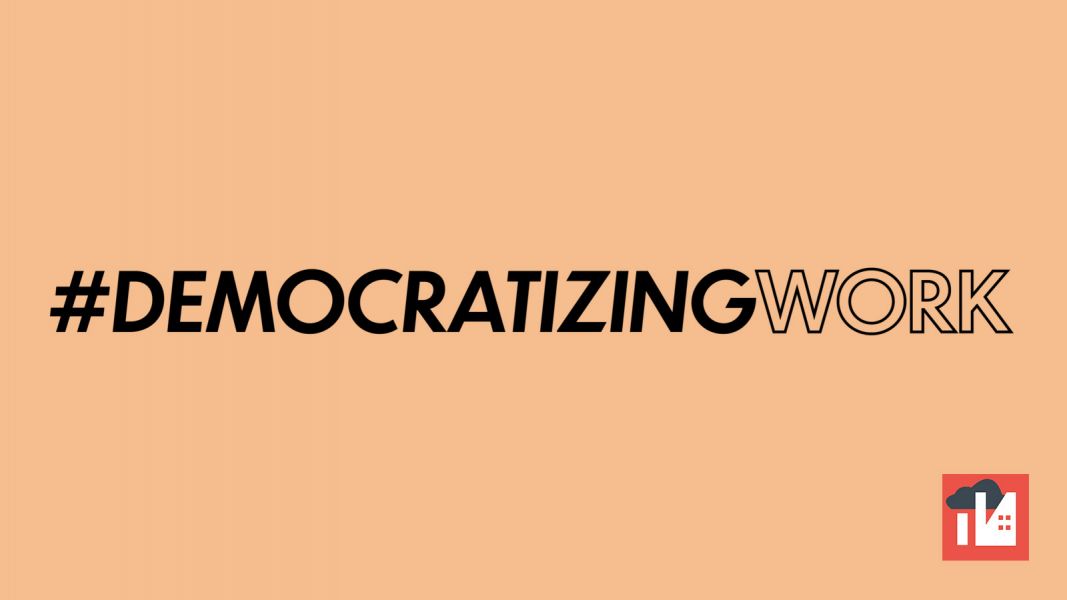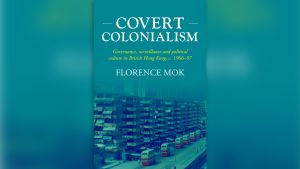
Work: Democratise, Decommodify, Remediate
The Made in China Journal is happy to join other 36 newspapers in 32 countries in publishing this urgent call by more than 3,000 researchers from universities around the globe to heed the lessons of the Covid-19 crisis and rewrite the rules of our economic systems in order to create a more democratic and sustainable society. Their call, made in the midst of an unprecedented health, climate, and political crisis, paves a positive path forward, following three core principles: democratise (firms), decommodify (work), and remediate (policies) in order to respect planetary boundaries and make life sustainable for all. Scroll below for the Chinese version of the text.
The Editors
__
Working humans are so much more than ‘resources’. This is one of the central lessons of the current crisis. Caring for the sick; delivering food, medication, and other essentials; clearing away our waste; stocking the shelves and running the registers in our grocery stores—the people who have kept life going through the Covid-19 pandemic are living proof that work cannot be reduced to a mere commodity. Human health and the care of the most vulnerable cannot be governed by market forces alone. If we leave these things solely to the market, we run the risk of exacerbating inequalities to the point of forfeiting the very lives of the least advantaged. How to avoid this unacceptable situation? By involving employees in decisions relating to their lives and futures in the workplace—by democratising firms. By decommodifying work—by collectively guaranteeing useful employment to all. As we face the monstrous risk of pandemic and environmental collapse, making these strategic changes would allow us to ensure the dignity of all citizens while marshalling the collective strength and effort we need to preserve our life together on this planet.
Why democratise?
Every morning, men and women rise to serve those among us who are able to remain under quarantine. They keep watch through the night. The dignity of their jobs needs no other explanation than that eloquently simple term, ‘essential worker’. That term also reveals a key fact that capitalism has always sought to render invisible with another term, ‘human resource’. Human beings are not one resource among many. Without labour investors, there would be no production, no services, no businesses at all.
Every morning, quarantined men and women rise in their homes to fulfil from afar the missions of the organisations for which they work. They work into the night. To those who believe that employees cannot be trusted to do their jobs without supervision, that workers require surveillance and external discipline, these men and women are proving the contrary. They are demonstrating, day and night, that workers are not one type of stakeholder among many: they hold the keys to their employers’ success. They are the core constituency of the firm, but are, nonetheless, mostly excluded from participating in the government of their workplaces—a right monopolised by capital investors.
To the question of how firms and how society as a whole might recognise the contributions of their employees in times of crisis, democracy is the answer. Certainly, we must close the yawning chasm of income inequality and raise the income floor—but that alone is not enough. After the two World Wars, women’s undeniable contribution to society helped win them the right to vote. By the same token, it is time to enfranchise workers.
Representation of labour investors in the workplace has existed in Europe since the close of WWII, through institutions known as Work Councils. Yet, these representative bodies have a weak voice at best in the government of firms, and are subordinate to the choices of the executive management teams appointed by shareholders. They have been unable to stop or even slow the relentless momentum of self-serving capital accumulation, ever more powerful in its destruction of our environment. These bodies should now be granted similar rights to those exercised by boards. To do so, firm governments (that is, top management) could be required to obtain double majority approval, from chambers representing workers as well as shareholders. In Germany, the Netherlands, and Scandinavia, different forms of codetermination (mitbestimmung) put in place progressively after WWII were a crucial step toward giving a voice to workers—but they are still insufficient to create actual citizenship in firms. Even in the United States, where worker organising and union rights have been considerably suppressed, there is now a growing call to give labour investors the right to elect representatives with a supermajority within boards. Issues such as the choice of a CEO, setting major strategies, and profit distribution are too important to be left to shareholders alone. A personal investment of labour; that is, of one’s mind and body, one’s health—one’s very life—ought to come with the collective right to validate or veto these decisions.
Why decommodify?
This crisis also shows that work must not be treated as a commodity, that market mechanisms alone cannot be left in charge of the choices that affect our communities most deeply. For years now, jobs and supplies in the health sector have been subject to the guiding principle of profitability; today, the pandemic is revealing the extent to which this principle has led us blind. Certain strategic and collective needs must simply be made immune to such considerations. The rising body count across the globe is a terrible reminder that some things must never be treated as commodities. Those who continue arguing to the contrary are imperilling us with their dangerous ideology. Profitability is an intolerable yardstick when it comes to our health and our life on this planet.
Decommodifying work means preserving certain sectors from the laws of the so-called ‘free market’; it also means ensuring that all people have access to work and the dignity it brings. One way to do this is with the creation of a Job Guarantee. Article 23 of the Universal Declaration of Human Rights reminds us that everyone has the right to work. A Job Guarantee would not only offer each citizen access to work that allows them to live with dignity, it would also provide a crucial boost to our collective capability to meet the many pressing social and environmental challenges we currently face. Guaranteed employment would allow governments, working through local communities, to provide dignified work while contributing to the immense effort of fighting environmental collapse. Across the globe, as unemployment skyrockets, job guarantee programs can play a crucial role in assuring the social, economic, and environmental stability of our democratic societies.
Environmental remediation.
We should not react now with the same innocence as in 2008, when we responded to the economic crisis with an unconditional bailout that swelled public debt while demanding nothing in return. If our governments step in to save businesses in the current crisis, then businesses must step in as well, and meet the general basic conditions of democracy. In the name of the democratic societies they serve, and which constitute them, in the name of their responsibility to ensure our survival on this planet, our governments must make their aid to firms conditional on certain changes to their behaviors. In addition to hewing to strict environmental standards, firms must be required to fulfil certain conditions of democratic internal government. A successful transition from environmental destruction to environmental recovery and regeneration will be best led by democratically governed firms, in which the voices of those who invest their labour carry the same weight as those who invest their capital when it comes to strategic decisions. We have had more than enough time to see what happens when labour, the planet, and capital gains are placed in the balance under the current system: labour and the planet always lose. Thanks to research from the University of Cambridge Department of Engineering (Cullen, Allwood, and Borgstein, Envir. Sci. & Tech. 2011 45, 1711–18), we know that ‘achievable design changes’ could reduce global energy consumption by 73%. But … those changes are labour intensive, and require choices that are often costlier over the short term. So long as firms are run in ways that seek to maximise profit for their capital investors alone, and in a world where energy is cheap, why make these changes? Despite the challenges of this transition, certain socially-minded or cooperatively run businesses—pursuing hybrid goals that take financial, social, and environmental considerations into account, and developing democratic internal governments—have already shown the potential of such positive impact.
Let us fool ourselves no longer: left to their own devices, most capital investors will not care for the dignity of labour investors; nor will they lead the fight against environmental catastrophe. Another option is available. Democratise firms; decommodify work; stop treating human beings as resources so that we can focus together on sustaining life on this planet.
劳动:民主化, 去商品化, 洁净化
参与劳动和工作的人们远不应被认为只是一种“资源”, 这是当前危机带来的核心教训之一。他们照顾病人,递送食物、药物和其他生活必需品;他们清理废物垃圾,保证商店中有足够的日用品以及买卖的正常运行。在当前新型冠状病毒病大流行下,他们的存在保证了我们的生活能够继续,这一切生动地证明了劳动不能仅仅被视为商品。与此同时,仅凭市场力量也无法管理人类健康和提供对最弱势群体的照顾。如果我们将这些领域完全留给市场掌控,那我们就会面临加剧当前不平等状况的风险,甚至会牺牲最弱势群体的生命。要怎样才能避免这种不可接受的状况? 首先要让员工参与到与其工作和生活有关的决定的拟定过程当中,从而使得企业民主化。其次要促进劳动去商品化,从集体层面保证大众的优越就业机会。特别是当我们面临疾病大流行和自然环境崩坍瓦解的巨大风险时,执行这些战略性改革才能让我们在确保公民尊严的同时在全世界范围内集结共同维护生命所需的集体力量和努力。
为什么要让企业民主化?
大量劳动者们日夜勤恳地为我们当中那些需要接受隔离的群体服务。人们称他们为“关键劳动者”(essential worker),这就足以体现出他们的尊严和他们绝不平凡的职业。这一称呼揭示了上述的关键事实,而资本主义一直试图——通过另一个称谓,“人力资源”——来掩盖这一事实。但事实上劳动工作者并不仅仅是资源,他们更是投资者。因为没有劳动投资者,就不会有任何生产,服务或者生意。
日日夜夜,勤勤恳恳,被隔离的人们在他们的家中远程履行他们所在机构交给他们的任务。有人认为员工在没有监督的情况下不能被信任,他们要求对工人进行格外的监督和并加强纪律规范。远程工作成功地驳斥了这一论点。 劳动者每日反复地证明着他们不单只是利益相关者,他们是企业的关键组成部分,但尽管如此,他们仍然被排除在参与其工作管理权力之外,因为管理权力是一项只由资本投资者垄断的权力。
在当前的危机时刻,我们深刻地认识到劳动工作者的贡献必须得到企业以及整个社会的进一步的认识,当然我们必须填补日益加剧的不平等的收入鸿沟,并且提高最低收入水平,但是仅仅如此是不够的。 历史上,两次世界大战之后,妇女们对社会付出的不可否认的贡献帮助她们获得了选举权。 同样地,劳动者在这次全球范围内的流行病中做出的贡献足以证明他们应当获得企业中的公民权。
在欧洲,虽然自从第二次世界大战以来,以劳动进行投资的一方可以由工作委员会来代表。然而,这些代表机构在企业管理层中的声音仍然微弱,并且需服从股东任命的高管团队的决定。他们受限的发言权一直以来无法阻止或者减慢资本急剧持续的增长,而其增长对环境的破坏更是巨大的,然而劳动投资者对此话题却没有发言权。因此,劳动投资者应当被授予与董事会类似的权力。 为此,“企业政府”(即最高管理者)需获得股东以及劳动投资者代表的双重投票通过。德国,荷兰或者斯堪的纳维亚国家,都逐步在第二次世界大战后建立了不同形式的共同决定机制(mitbestimmung),这被视为是给予劳动者更多发言权的重要的进步,但是始终不足以在企业中为劳动者建立实际的公民身份。甚至在工人组织权和工会权利都受到一定程度的压制的美国,人们对于赋予劳动投资者权力去选举董事会中的绝大多数代表席位的呼吁都在日益增长。譬如首席执行官席位的选择,此席位涉及制定极为重要的主要企业战略以及利润分配等问题,不能单单只由股东来选择。 通过劳动完成的投资是一个人的体力(身)以及脑力(心)以及生命的共同投资,那么他们也应当获得对于这些话题的相对决定权。
为什么要去商品化?
因为这场危机明确地表明了劳动不应该被视为商品, 而且不能够单靠市场机制来定夺对整体社会和大众的决定。近年来,卫生部门的工作和用品被一直要求遵循以盈利为主的原则来管理。如今,大流行病揭示了这一原则的极度盲目。因为某些战略的和集体的需求是不能够单纯的以市场盈利为准的。全球范围内不断增长的令人震惊的死亡人数今天正在提醒我们,有些东西是绝不能被单纯视为商品的。 那些继续反驳的人正在用他们危险的意识形态置我们于困境之中。当涉及到健康和生命的时候,利润更是一条无法让人容忍的标尺。
促进劳动去商业化意味着保护某些领域免受所谓的“自由市场”法则的控制,这也能够同时确保所有人都能获得工作及其带来的尊严。一个有效的方案即是创建公共工作保障,为所有公民提供劳动的权利。《世界人权宣言》第二十三条告诉我们,任何人都有劳动就业的权利。公共工作保障不仅能够为每个公民提供使他们有尊严地生活的工作机会,而且还将极大地增强我们的集体力量,以应对我们目前面临的许多紧迫的社会以及环境问题的挑战。有保证的就业可以促使政府加强与地方社区合作,以提供有尊严的工作,同时努力与自然环境的崩溃作斗争。在全球范围内,随着失业率的飙升,工作保障计划可以在确保我们民主制度中的社会、经济和环境稳定方面发挥至关重要的作用。欧盟可以将此类项目纳入“绿色新政”中。欧洲中央银行对资金的合理投入关系到欧盟的成败,因此它的职能应该被重新界定,这能使它在欧洲人民的生活中获得一个正当合理的地位。面临即将降临的爆炸性的大范围失业和经济不景气,反周期策略将会对欧盟的社会、经济和化境等各方面长期发展做出重要贡献。
至于洁净化:
我们不应该重复2008年做出的幼稚决策,当时人们无条件的增加了公共债务以救助银行等金融机构。面对此次危机,如果我们的政府再次介入拯救企业,那么企业必须以推进其民主化为受援助的基本条件。以服务和组建其民主社会为名义,以确保我们在地球上生存责任的名义,我们的政府必须将对企业的援助作为条件以促进企业的改革。除了要求企业遵守严格的环境标准外,“企业政府”需要推进内部民主化管理。因为民主化管理的企业已经为领导经济的绿色转型做好了准备,在民主管理的企业中,劳动投资者和资本投资者的声音一样重要,特别在做战略决定的时候。人人皆知在当前大环境下, 资本主义无法调理资本收益和工作劳动者利益以及环境利益的冲突。得益于剑桥大学工程系的研究(Cullen,Allwood和Borgstein,Envir. Sci. &Tech. 2011 45,1711–18),我们知道“可实现的变更设计”可以将全球能源消耗减少73% , 但是这些变化涉及生产方式的改变:大量增加劳动者密集度,一个短期内相对昂贵的选择。 问题在于,在如今全球能源价格极低的情况下, 如果企业继续以寻求为其资本投资者短期最大利润为目的运营方式,怎样才能找到施行绿色改革的动力?尽管面对这样的改革挑战,个别具有强烈社会意识的或者合作经营型企业——这种企业着力于兼顾经济效益、社会福利和环境保护等不同目标,和推进民主化的企业内部管理——已经显现出了这种积极影响的巨大潜力。
我们不能够再自欺欺人了。在没有制衡的情况下,大多数资本投资者无法关心劳动投资者的尊严,也无从领导与自然环境崩坍瓦解的斗争。另一个选项是可能的,即推进企业民主化,推动劳动去商品化,停止将劳动者视为资源,以便让我们能够共同携手维持地球上的生命的延续。
16 May 2020
Isabelle Ferreras (University of Louvain/FNRS-Harvard LWP), Julie Battilana (Harvard University), Dominique Méda (University of Paris Dauphine PLS), Julia Cagé (Sciences Po-Paris), Lisa Herzog (University of Groningen), Sara Lafuente Hernandez (University of Brussels-ETUI), Hélène Landemore (Yale University), Pavlina Tcherneva (Bard College-Levy Institute), Alberto Alemanno (HEC Paris-NYU Law), Elizabeth Anderson (University of Michigan), Philippe Askénazy (CNRS-Paris School of Economics), Aurélien Barrau (CNRS et Université Grenoble-Alpes), Adelle Blackett (McGill University), Neil Brenner (Harvard University), Craig Calhoun (Arizona State University), Ha-Joon Chang (University of Cambridge), Erica Chenoweth (Harvard University), Joshua Cohen (Apple University, Berkeley, Boston Review), Christophe Dejours (CNAM), Olivier De Schutter (UCLouvain, UN Special Rapporteur on extreme poverty and human rights), Nancy Fraser (The New School for Social Research, NYC), Archon Fung (Harvard University), Javati Ghosh (Jawaharlal Nehru University), Stephen Gliessman (UC Santa Cruz), Hans R. Herren (Millennium Institute), Axel Honneth (Columbia University), Eva Illouz (EHESS, Paris), Sanford Jacoby (UCLA), Pierre-Benoit Joly (INRA – National Institute of Agronomical Research, France), Michele Lamont (Harvard university), Lawrence Lessig (Harvard University), David Marsden (London School of Economics), Chantal Mouffe (University of Westminster), Jan-Werner Müller (Princeton University), Gregor Murray (University of Montréal), Susan Neiman (Einstein Forum), Thomas Piketty (EHESS-Paris School of Economics), Michel Pimbert (Coventry University, Executive Director of Centre for Agroecology, Water and Resilience), Raj Patel (University of Texas), Katharina Pistor (Columbia University), Ingrid Robeyns (Utrecht University), Dani Rodrik (Harvard University), Saskia Sassen (Columbia University), Debra Satz (Stanford University), Pablo Servigne PhD (in-Terre-dependent researcher), William Sewell (University of Chicago), Susan Silbey (MIT), Margaret Somers (University of Michigan), George Steinmetz (University of Michigan), Laurent Thévenot (EHESS), Nadia Urbinati (Columbia University), Jean-Pascal van Ypersele de Strihou (UCLouvain), Judy Wajcman (London School of Economics), Léa Ypi (London School of Economics), Lisa Wedeen (The University of Chicago), Gabriel Zucman (UC Berkeley), and 3,000 more scholars from more than 600 universities across the globe.
The full list of signatories is available at https://democratizingwork.org/





